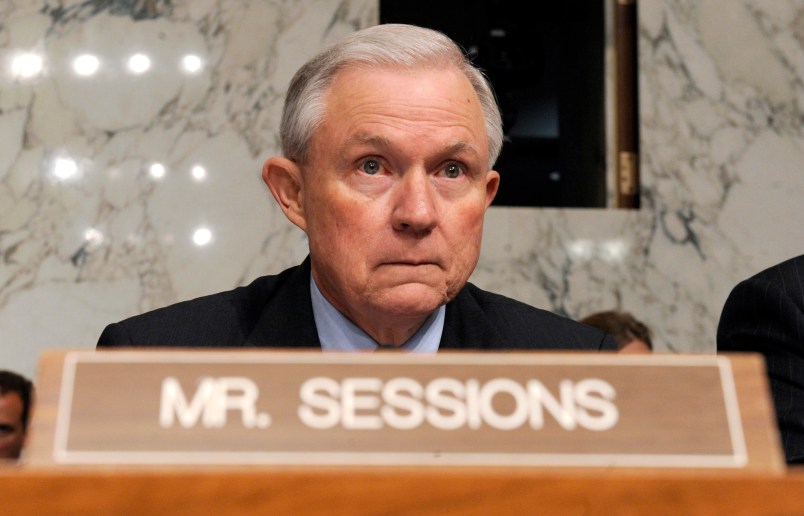The likely next chairman of the Senate Budget Committee is calling on his Republican colleagues to use the government funding process to thwart President Barack Obama’s upcoming executive actions on immigration.
In an op-ed Monday for Politico magazine, Sen. Jeff Sessions (R-AL), currently ranking member of the committee, said it would be “unthinkable” for Congress to pass a long-term spending bill that doesn’t block funding for Obama’s expected actions to free some immigrants from the threat of deportation.
“President Obama’s executive amnesty … cannot be implemented if Congress simply includes routine language on any government funding bill prohibiting the expenditure of funds for this unlawful purpose,” wrote Sessions, a longtime foe of immigration reform.
This strategy is similar to the one that Sen. Ted Cruz (R-TX) persuaded Republicans to adopt in 2013 in a quest to defund Obamacare. It did not work: Obama held firm, the government shut down, and 16 days later Republicans backed down and agreed to fund Obamacare along with the rest of the federal government.
While Sessions’s language on immigration now echoes Cruz’s language on Obamacare in 2013, advocates of the Alabama Republican’s strategy point out that unlike Obamacare, the immigration bill never passed Congress. So this time they wouldn’t be using the funding process to change the law, they’d be using it to maintain the law as it’s currently being enforced.
“Why would any member of Congress who opposes executive amnesty provide President Obama the funds to carry it out? A Republican majority must force congressional Democrats to answer this question through their votes,” Sessions wrote.
He added: “We cannot yield to open borders. We cannot let one executive edict erase the immigration laws of an entire nation. If we believe America is a sovereign country, with enforceable boundaries, and a duty to protect its own people, then we have no choice but to fight and to win.”
The strategy was floated in August by Sen. Marco Rubio (R-FL), who voted for the Senate immigration bill last year but fiercely opposes the idea of Obama acting on his own.
Congress must pass a government funding bill by Dec. 11 to prevent a lapse in appropriations. With Democrats in the Senate majority until January, a “rider” to block Obama’s immigration moves would be a nonstarter. The likelier outcome is a short-term spending bill that maintains the status quo and doesn’t strip that power from Obama — at least until Republicans take control of the chamber.
Once Republicans take the Senate, the big question is whether incoming Majority Leader Mitch McConnell (R-KY) and House Speaker John Boehner (R-OH) decide to wage that fight. Both strongly object to Obama’s executive actions. McConnell has vowed to use the funding process to rein in Obama’s bureaucracy, but he hasn’t said if he’d do so on immigration. He has also promised not to shut down the government once he’s majority leader.
“There will be no government shutdowns and no default of the national debt,” McConnell said the day after the election.
The conservative pressure to fight is strong and growing stronger. If Boehner and McConnell were to take up that fight, it wouldn’t be quite the same as the 2013 Obamacare battle, because Republicans would run both chambers of Congress. A government funding bill that prohibits executive action on immigration would be an easy sell in the Republican-led House, and potentially passable in the Republican-led Senate, as numerous Democrats have expressed discomfort with the idea of Obama acting unilaterally.
That would spark a stare-down between Obama and the GOP Congress. As Boehner and McConnell remember from the 1990s, the President typically has the advantage because voters are primed to blame Congress for a shutdown. Obama has already angered the Hispanic community by delaying action, and he says he’s committed to acting by the end of the year.







Bring it, you bat-eared tiny-minded moron. Let’s see if you remember how it worked out for the tantrum-throwing congressman from Georgia.
Did you write this story from scratch, or did you pick one of the half-dozen others and just change “Obamacare” or “Bush Tax Cuts” or whatever to “Immigration”?
Excellent idea. Please demonstrate the GOP’s superior skills in problem-sovling, negotiating successful resolutions to contentious issues, and, above all, the GOP’s ability to manage a functional government. Impeach, shut down, and blame Obama when the Congress can’t do its damn job. God bless what once was a great country.
Problem is that a couple of Senate Blue Dogs (see Manchin, J.) would side with the GOP in a shutdown, but no matter. ‘Congress’ will be blamed, not PBO.
“Executive amnesty” is the recommended talking point in the memo sent to the Racist Party.